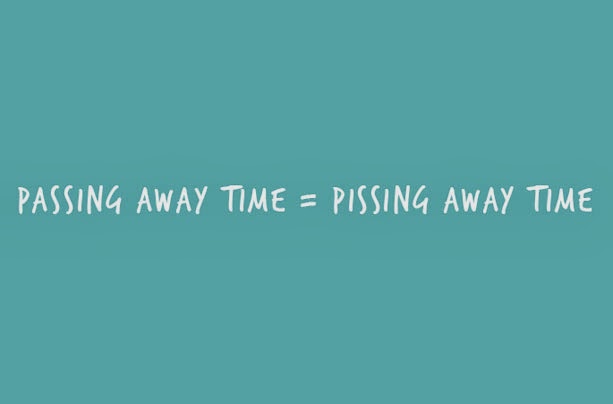Friday, 18 October 2013
STRATEGIES OF THOUGHT - BOREDOM
I still haven't quite decided how to write about these lectures so here I thought I'd try something a bit different by firstly typing up my notes (which might not make much sense!) and then write a bit about them.
Text sent out to read before hand: The fundamental concepts of metaphysics. Chapter two - The first form of boredom: Becoming bored by something.
Sense of a vague feeling.
Geroge Steiner - 1978 In place of the forward.
Steiner - Not interested in the understanding, more the experience.
Never the goal, only the journey and first step that counts.
Going to work is necessary but not always pleasurable.
Sometimes it is good to have structure (being in lectures at a particular time) other times it's a grind.
Boredom potentially results in being more creative.
Different types of boredom.
Everyday boredom is more of a shadow of actual boredom.
We pass time in order to master it, to have more control over it.
Like going for a walk to pass the time.
Passing away time = Pissing away time.
Why would you want time to go quickly?
Boredom is essential due to what it produces and how it works.
Profound boredom - more creative by not resisting boredom.
Don't escape it, let it resonate you as you move to being on the verge of something else.
Doing can be of the mind and body, if you're not making it doesn't mean you're not doing.
Assumed boredom - Their exterior is blank but there's life internally.
Profound boredom (feeling of possibility) - attune ourselves to always be on the verge of something.
Rich people being bored is not the same as the poor being bored.
Enthusiasm caught in own world of having too much choice of things to do.
People working enjoy watching other people working.
We convince ourselves that work is essential in life.
Yawning - psychical thing that makes others do the same.
Superficial boredom - familiar, mixed in with tiredness, this is often a perception of boredom.
Is reality insufficient?
Anna Starkey images - Constructed, rain makes everything the same grey plateau!
Martin Parr - collection of boring postcards.
Collection of images of bored couples.
To be bored is to be of the moment.
After reading back through these it feels like I've just noted down a few 'keep calm' poster ideas!
Even writing the word bored or boredom feels quite dull and I guess boring in a way! It's interesting to think that being bored can lead you to being on the verge of something else. If you were to go in the opposite direction of being bored (a few google searches for the opposite of bored - fascinated, active, excited, engaging, interesting) would that "task" you decided to do be less exciting/fascinating/interesting/active than if you were to become in a state of boredom and then decide to do the same thing? What is the opposite of being bored? How can bored be defined by one word yet it's opposite brings about many? Would it be worth my while one day every week to do absolutely nothing and become bored? Would it enhance the following 6 days and make them even more worthwhile and productive than if I'd have not had a day of boredom? This makes me think of Stefan Sagmeister's brilliant idea about retirement. Rather than retire at say the normal age of 60, Sagmeister has decided to add on say 10 years to his retirement date and slot these extra years into his working time now. So every 7 years he takes a year out from client work and uses the time to get away from his studio and create the kind of work he can do free of the client. This then feeds back tenfold into the studio practise at the end of the year. Is this in some way the same principle?
The third line or so of my notes 'Never the goal, only the journey and first step that counts.' makes me think of a point that keep reoccurring over the past few weeks. The work we have to hand in for Practise one is more about the research and development of your work than a finished polished piece. It is about getting you to understand the journey and how you arrive at something rather than what it is. If you produce something but have no idea why, what is it's purpose? In art school where they teach undergraduate design, you are taught more about how to think and develop your work and understand why you are doing it because everything else are things that you can learn perhaps without the aid of someone else, learning computer software etc. This is the most fundamental and important part of being at art school as it carries on after when you work or take an internship somewhere, it is the experience that is more important than the product you end up with. Whilst what you create is obviously important, it is the understanding of how it came about that allows you to go further on your next journey.
Labels:
Dr Steven Gartside,
Lecture,
Strategies of Thought
Subscribe to:
Post Comments (Atom)


No comments:
Post a Comment